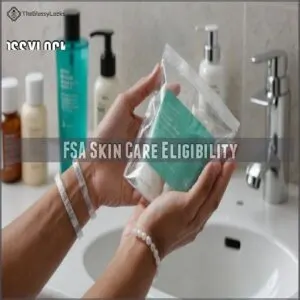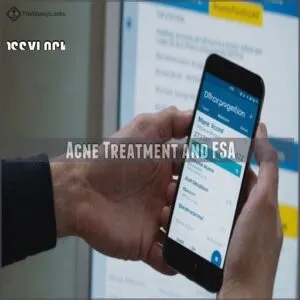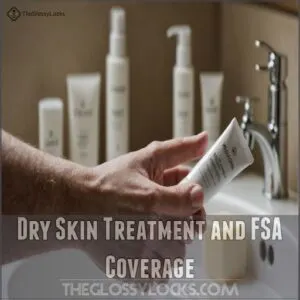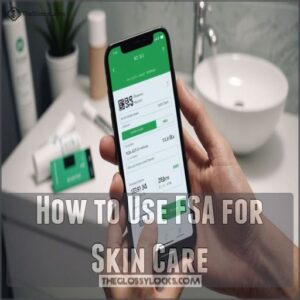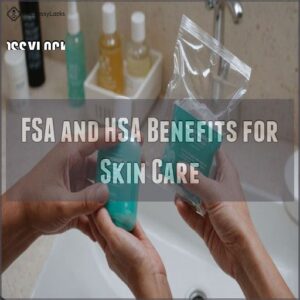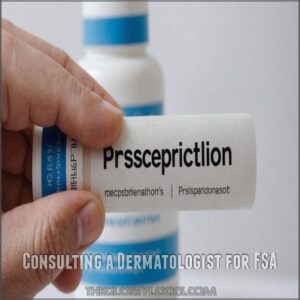This site is supported by our readers. We may earn a commission, at no cost to you, if you purchase through links.
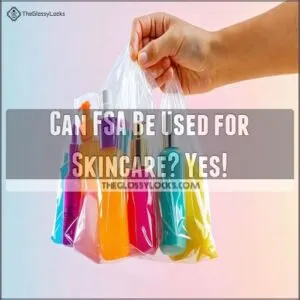 Can FSA be used for skin care? Absolutely, but there’s a catch. You can’t buy that fancy new face cream with it.
Can FSA be used for skin care? Absolutely, but there’s a catch. You can’t buy that fancy new face cream with it.
Your Flexible Spending Account (FSA) covers specific skin care items that are medically necessary.
Think sunscreen for UV protection and acne treatments—those are typically eligible.
However, using FSA funds for general cosmetic products isn’t on the table.
Visits to a dermatologist might also qualify if they’re for medical reasons.
So, while you can’t splurge on that luxury moisturizer, your FSA can still lend a hand for key health-related products.
Curious about the ins and outs of this? Read on!
Table Of Contents
- Key Takeaways
- FSA Skin Care Eligibility
- What Qualifies as a Medical Expense
- Skin Conditions and FSA Coverage
- How to Use FSA for Skin Care
- FSA and HSA Benefits for Skin Care
- Consulting a Dermatologist for FSA
- Understanding FSA Account Details
- Maximizing FSA Benefits for Skin Care
- FSA and HSA Store Options
- Frequently Asked Questions (FAQs)
- Which skin care products are eligible for FSA?
- Are dermatological treatments eligible for FSA?
- Can I use my FSA for skin care?
- Are beauty products covered by the FSA?
- What skincare is covered under FSA?
- Can I buy lotion with my FSA?
- Can I use my FSA for cosmetic?
- Can you buy deodorant with FSA?
- Can FSA pay for cosmetic skin treatments?
- Are anti-aging products FSA eligible?
- How do I submit receipts for FSA?
- Can I use FSA for spa treatments?
- What documentation is needed for FSA claims?
- Conclusion
Key Takeaways
- You can use your FSA for skin care items that are medically necessary, like sunscreen with SPF 15+ and acne treatments. Always verify your plan’s eligible expenses.
- Don’t use your FSA for purely cosmetic products. While some anti-aging products might qualify if prescribed, always check your plan’s specifics.
- Keep all receipts for eligible purchases to simplify the reimbursement process and ensure you’re taking full advantage of your FSA benefits.
- Consult a dermatologist for treatments to enhance your chances of FSA coverage, especially when a medical necessity letter is required for certain products.
FSA Skin Care Eligibility
You can use your FSA for specific skin care items, like sunscreens with SPF 15+ and acne treatments, as long as they’re eligible expenses.
It’s important to understand the differences between FSA and HSA accounts to make the most of these benefits.
Specific Skin Care Items Covered
Regarding FSA and skincare, you’d be surprised at what’s eligible.
Think sunscreen with SPF 15+, acne treatments, and even specific facial cleansers.
Some FSA-approved treatments, such as those involving lice removal methods, may address underlying skin or scalp issues, and anti-aging products and hair removal treatments might make the cut, too.
However, always check your plan’s list to avoid surprises.
Staying informed means you can cleverly use your FSA benefits to cover these essential items.
Differences Between FSA and HSA
Contribution limits and rollover rules set FSAs and HSAs apart.
With FSA, you’ve got to spend it or lose it by year-end—no rollover.
Considering the long-term benefits of a consistent skincare routine, like preventing signs of aging and reducing the risk of skin cancer through sun protection measures, it’s important to make the most of your annual FSA contributions.
HSAs, however, let funds grow tax-free and roll over each year.
Plus, they offer investment options, giving you a savvy way to plan for future expenses.
Both help with eligible medical costs but keep their unique quirks in mind.
What Qualifies as a Medical Expense
Understanding what qualifies as a medical expense is important for using your FSA funds effectively.
You’ll find that eligible expenses often include necessary medical and skincare items, so knowing the specifics can save you money.
Definition of Medical Expenses
Understanding medical expenses is key to making the most of your FSA.
These expenses offset out-of-pocket costs and offer tax benefits through qualified expenses, including certain skincare treatments that can be considered medical expenses, such as purchasing affordable hydrating moisturizers.
Think of it as a safety net for your wallet, covering:
- Health insurance premiums: A go-to for many.
- Out-of-pocket costs: Expenses not covered by your plan.
- Medical deductions: A way to lessen your tax load.
Eligible Skin Care Expenses
Finding FSA-approved brands for skincare can feel like a treasure hunt.
Think sunscreen with SPF 15+ as your golden ticket.
Acne treatments and prescription skincare can include natural remedies such as tea tree oil for acne. Acne treatments and prescription skincare? They’re often in the clear too.
But, regarding makeup and skincare, check if it’s prescription or over-the-counter.
Remember, not all items are eligible under HSA plans, so always keep an eye on labels.
Skin Conditions and FSA Coverage
Dealing with acne, dry skin, or even skin cancer?
You might be surprised to learn that your FSA can help cover the costs of treatment and related products.
Let’s explore how your FSA can help manage various skin conditions.
Acne Treatment and FSA
You might be surprised, but your FSA can help tackle acne woes.
Prescription medications, like retinoids, are covered, offering some relief for your skin and wallet, and often work in conjunction with topical treatments for severe acne.
Even some over-the-counter acne treatments might qualify if your dermatologist gives the nod.
Brands like Differin and Neutrogena often fall into the FSA-friendly category.
Check your plan’s FSA limits and eligible products.
Skin Cancer Screening and Mole Removal
Acne treatments aren’t the only concerns when using FSA.
Skin cancer prevention is a top priority.
You can also purchase sunscreen and other skincare products through websites like FSA skin care products.
Here’s what you should know:
- Dermatologist recommendations: Regular check-ups aid early detection.
- Mole removal costs: FSA covers these procedures if medically necessary.
- Sunscreen importance: Use SPF daily to ward off harmful UV exposure.
Stay vigilant, protect your skin, and use FSA to help manage expenses.
Dry Skin Treatment and FSA Coverage
Though dry skin might bug you, your FSA can ease the itch! Eczema treatment creams and specialized lotions often qualify if a medical necessity letter is handy.
Check the table below for eligible items.
| Item | FSA Eligible? |
|---|---|
| Moisturizing Cream | Yes |
| Eczema Cream | Yes |
| Anti-itch Lotion | Yes |
| Basic Lip Balm | No |
| Standard Lotion | No |
Keep receipts to meet FSA limits and soothe those costly concerns!
How to Use FSA for Skin Care
If you have acne-prone skin with sensitive skin triggers, figuring out the rules for using your FSA on skin care products can save you time and money.
By understanding eligible expenses and how to submit receipts, you can make the most out of your FSA benefits.
Understanding FSA Account Rules
Think of your FSA as a magical ticket to cover health expenses, including skincare, but with rules.
Each account has its quirks: contribution limits, enrollment deadlines, and account types.
Understanding these is key to avoiding stumbles.
Get to know your plan’s specifics—whether you’re preparing for the FSA claim process or gathering essential documentation requirements—to make sure you use it smoothly and effectively.
Submitting Receipts for Reimbursement
Submitting receipts for reimbursement can feel like herding cats, but it’s a key step in using your FSA for skincare.
Keep track of every small proof of purchase.
Digital receipts simplify the reimbursement process; consider snapping pictures of paper ones.
Lost receipts? They’re like runaway socks—virtually impossible to find.
Stay organized, and you’ll smoothly sail through your reimbursement journey with ease.
FSA and HSA Benefits for Skin Care
You can use pre-tax dollars from your FSA or HSA account to cover eligible skincare expenses.
Understanding the differences between these accounts—like HSA’s investment potential and FSA’s yearly expiration—helps you maximize your savings for healthy skin.
Comparison of FSA and HSA Benefits
Balancing FSA and HSA benefits can feel like a tug of war, but choosing the right one often depends on your personal grooming needs, including considering the best shaver vs trimmer (understanding grooming tools).
FSAs lose funds annually, while HSAs roll over.
Both offer tax perks, yet HSAs boast investment options for future growth.
Choose an HSA if your health plan qualifies.
Remember, understanding eligibility, like FSA vs HSA eligibility, can make or break your decision.
Investing HSA Funds for Future Expenses
While exploring how FSA helps with skin care, it’s also smart to think about HSA investment strategies for the future.
HSA funds stick around, unlike FSA ones.
You can use HSA portfolio diversification to grow your savings tax-free.
Picture it as a reliable backup, ensuring long-term HSA growth.
Just mind the HSA withdrawal rules to fully enjoy its tax advantages.
Consulting a Dermatologist for FSA
When you consult a dermatologist for your skincare needs, it can boost your chances of effectively using FSA funds.
They can provide a medical necessity letter, which is often required to qualify certain skincare expenses.
Importance of Medical Necessity Letters
You’ve got your FSA set for skincare goodies, but there’s a catch—certain items may need a medical necessity letter.
Imagine it like a doctor’s note for your beauty routine.
Some expenses, like acne treatments or pricey moisturizers, mightn’t automatically qualify.
Here’s where a dermatologist steps in to confirm what your skin really needs.
This letter acts as documentation proof, aligning with reimbursement needs and plan specifics.
Just picture it as having your dermatologist vouch for your skin’s health.
Without it, those skincare purchases mightn’t get the green light from your FSA.
So, team up with your dermatologist for that all-important letter and keep your finances—and your skin—happy.
Understanding FSA Account Details
When using an FSA, it’s important to understand how much you can contribute annually and that any unused funds expire at the year’s end.
Knowing these details helps you plan your skincare purchases wisely before the deadline.
Annual Contribution Limits
Before you think about FSA contribution changes, know that understanding annual limits is important.
For 2024, the FSA limits have seen an increase, which impacts how much you can stash away for skin care expenses.
Keep your eye on these updates—navigating them can feel like a puzzle, but grasping them gives you control and opportunity to maximize your savings.
Expiration of FSA Funds
One important thing to remember about FSAs is that they don’t roll over.
Your Unused FSA funds disappear at the Year-end FSA deadline.
No FSA carryover!
Think of it like this: it’s use-it-or-lose-it.
You can use these funds to purchase eligible FSA skin care products before the deadline.
Plan your spending carefully to avoid losing those hard-earned dollars.
Maximize your FSA benefits before they vanish!
Don’t let your FSA funds expire; use them wisely.
Maximizing FSA Benefits for Skin Care
To make the most of your FSA benefits for skincare, keep track of all your receipts for eligible purchases.
This simple step guarantees you’re ready for easy reimbursement and maximizes your savings.
Keeping Receipts for Reimbursement
To get the most out of your FSA, keeping your receipts is like having a treasure map for tracking expenses.
Without them, you might feel like you’re searching for buried fortune with no clue where to dig.
Understanding FSA rules around reimbursement is key; they require proof of purchase for eligible items.
Consider using digital receipts for simpler organization and easy access—nothing worse than a shoebox full of paper clutter.
A good system streamlines the reimbursement process but also helps you stay on top of eligible purchases.
Whether it’s sunscreen or an acne treatment, knowing what you’ve spent and saved gives you the kind of freedom to manage your healthcare wisely.
FSA and HSA Store Options
Shopping for skincare options with FSA or HSA funds can feel like figuring out a maze.
Thankfully, you’ve got fantastic choices like FSAstore.com and HSAstore.com, making it easier to find eligible products.
These online retailers guarantee items qualify for your accounts, saving you from guesswork.
You can also explore websites specializing in HSA skincare products, offering a wide range of options.
Feel free to explore drugstore chains or major retailers’ pharmacies; many clearly mark FSA/HSA-eligible products on shelves.
You can also discover specialty items like sunscreens, acne treatments, and more, designed for your skincare needs.
While online shopping offers the convenience of home delivery, in-store options give you a hands-on experience.
With these resources, managing your health expenses becomes less overwhelming, letting you focus on what really matters—caring for your skin.
Frequently Asked Questions (FAQs)
Which skin care products are eligible for FSA?
Imagine indulging in soothing skincare, knowing you’re saving money.
Your FSA can cover essentials like sunscreens, acne treatments, and prenatal vitamins.
Check your plan for eligibility, as some products need a doctor’s note for approval.
Are dermatological treatments eligible for FSA?
It depends on your plan! Many FSA plans cover dermatological treatments, but some don’t. Check your plan’s specifics or ask your provider. Keep those receipts handy!
Can I use my FSA for skin care?
You can use your FSA for skincare products if they’re designed to treat or prevent a medical condition, like sunscreen with SPF 15+ or acne treatments.
Always check your plan’s eligible expenses to make sure you’re following the rules.
Are beauty products covered by the FSA?
Absolutely, some beauty products fall under FSA eligibility, like SPF 15+ sunscreens, acne treatments, and facial cleansers.
Check your specific FSA plan details and websites like Sephora for clearly marked eligible products to simplify shopping.
What skincare is covered under FSA?
Sunscreens with SPF 15+, acne treatments, and prenatal vitamins often qualify for FSA coverage.
You might also cover facial cleansers, aloe lotions, and anti-itch creams.
Check your plan specifics, as coverage can vary widely.
Can I buy lotion with my FSA?
Using your FSA for lotion may feel like finding treasure, but it depends on the type.
Sunscreens with SPF 15+ and certain medical lotions are typically covered.
Always check the eligibility with your plan’s guidelines.
Can I use my FSA for cosmetic?
You can use your FSA for certain skincare items, but purely cosmetic products aren’t typically covered.
Eligible expenses often include sunscreen, acne treatments, and moisturizers with a medical component.
Check your plan for specifics and reimbursement rules.
Can you buy deodorant with FSA?
Deodorant generally isn’t eligible for FSA reimbursement because it’s considered a personal care product rather than a medical necessity.
To find FSA-eligible items, check brands and websites that clearly mark qualifying products like fsastore.com.
Can FSA pay for cosmetic skin treatments?
Ironically, FSA funds aren’t usually for lavish spa days.
However, some skincare items, like acne treatments or sunscreen, might be covered.
Check your plan’s specifics; rules vary widely.
Receipts are your best friend!
Are anti-aging products FSA eligible?
Anti-aging products typically aren’t FSA eligible unless they’re deemed medically necessary, like prescription items.
Check your plan’s specifics and consider talking with your plan administrator.
Keep receipts, as some require proof for reimbursement.
How do I submit receipts for FSA?
Submitting FSA receipts is a breeze.
Gather your receipts, complete your claim form, and submit them via your plan’s online portal or by fax/mail.
Make sure they meet eligibility rules to avoid any financial mischief.
Can I use FSA for spa treatments?
You generally can’t use FSA funds for spa treatments unless they’re medically necessary, and a doctor’s note is required.
FSAs cover healthcare expenses, so check your plan’s guidelines to confirm what’s eligible.
What documentation is needed for FSA claims?
In 2023, 70% of FSA users forgot required documents!
Make sure your claims go smoothly by keeping itemized receipts, invoices showing service details, dates, and provider info.
Sometimes, a doctor’s letter of medical necessity is also essential.
Stay organized!
Conclusion
Understanding the ins and outs of FSA rules might feel like solving a mystery.
Yet, once you grasp the basics, using your FSA for skincare is entirely feasible.
You’ll focus on medically necessary products—think of essentials like sunscreen or acne treatments—not those fancy creams.
Always check what’s eligible and keep those receipts handy for reimbursement.
By understanding these guidelines, you can confidently tap into your FSA benefits for skin care while maximizing your savings.

